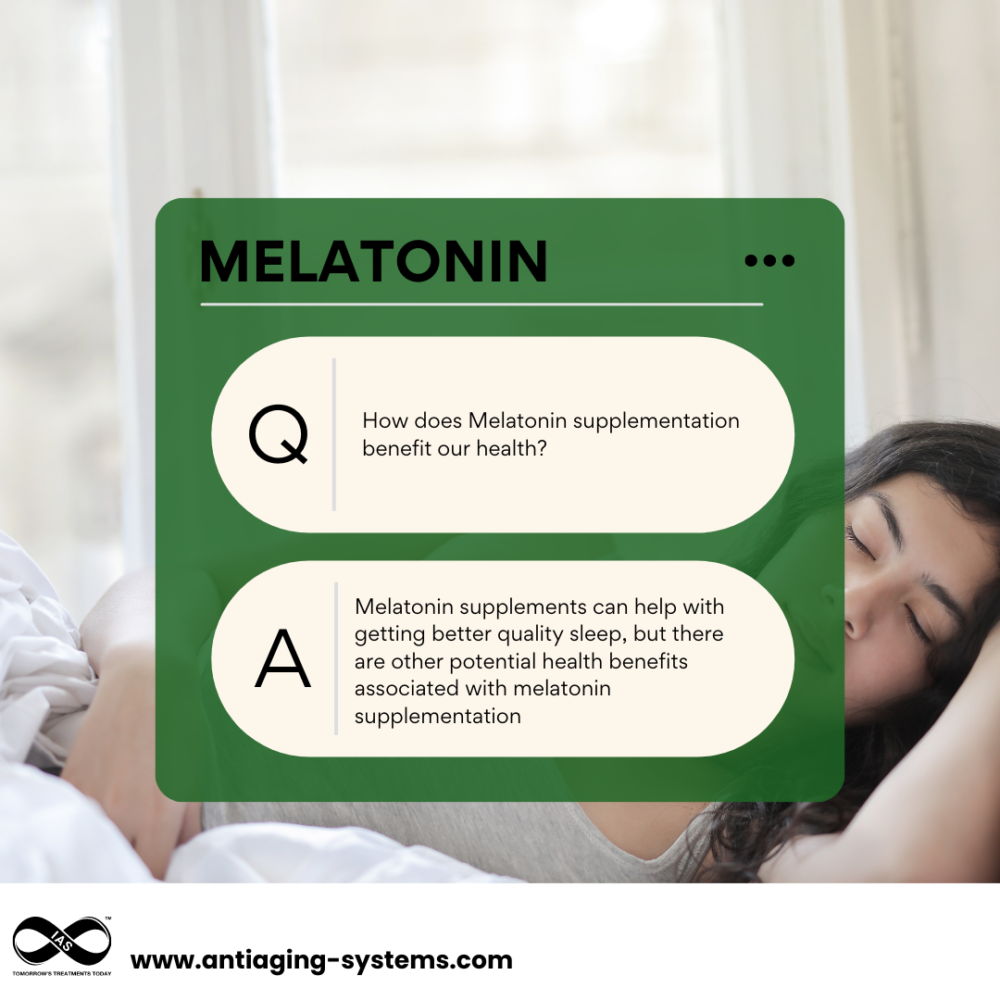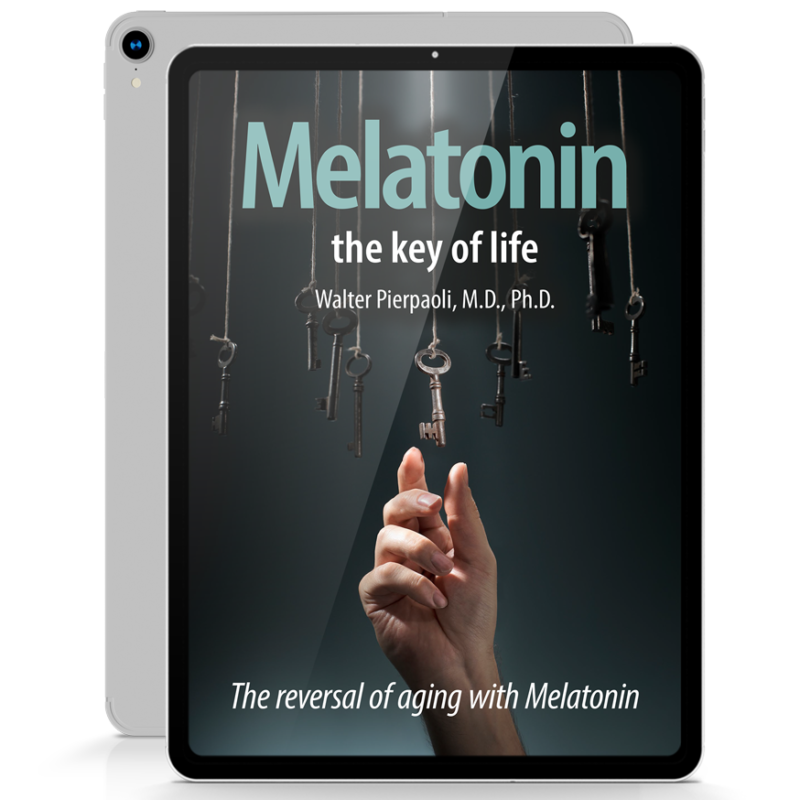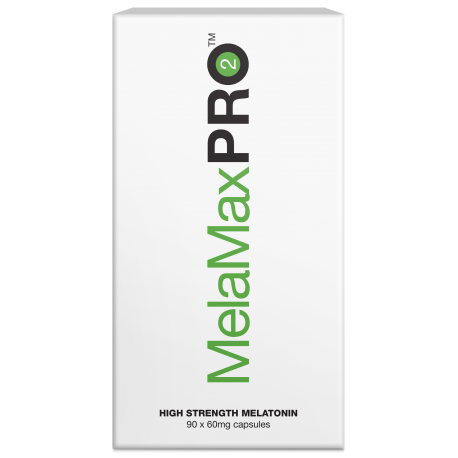Melatonin FAQ – What Is It, Why Do We Need It & Why Should We Supplement With It?
Melatonin FAQ – What Is It, Why Do We Need It & Why Should We Supplement With It?
Over the past decade, more and more people have been turning to melatonin supplements for their potential health benefits [1]. With the promise of better sleep and fewer age-related issues, the use of melatonin has become increasingly popular. But what exactly is melatonin, and how can it help with different health issues?
In this article, we will examine what melatonin is, how it affects the body, and whether we should take melatonin supplements.
What is Melatonin?
Melatonin is a hormone naturally produced by the pineal gland. It helps to regulate our circadian rhythms (sleep/wake cycle), telling us when it’s time to go to bed and when it’s time to wake up. When it’s dark, the body produces more melatonin, promoting sleep, while light decreases its production, signaling wakefulness [2].
Melatonin is also a powerful antioxidant, meaning it helps to protect our cells from free radical damage [3].
Why Do We Need Melatonin in Our Bodies?
The main purpose of melatonin in our bodies is to regulate our sleep-wake cycle and circadian rhythms. It helps us fall asleep and then stay asleep for an appropriate amount of time.
Getting enough quality sleep is essential for good mental and physical health. Those who lack quality sleep are more prone to develop health issues such as heart disease, depression, and even age-related issues such as dementia [4].
Melatonin has also been found to affect immunity, inflammation, and anxiety. Essentially, it helps to protect the body from stressors and keeps us in balance!
Sources of Melatonin
There are many natural sources of melatonin. The main source is the pineal gland, which is located in the brain and secretes melatonin.
We can also get melatonin from foods like tart cherries, walnuts, eggs, chicken, bananas, and tomatoes [5]. However, the amounts of melatonin found in food are very small and insufficient to have any major effect on our bodies. However, these foods are still high in other nutrients and offer various health benefits.
Another, more targeted source of melatonin is supplements. They are widely available in different forms, such as pills, gummies, and liquids.
Taking melatonin supplements can help regulate your sleep-wake cycle and circadian rhythm; however, you should always seek medical advice if you or a loved one have any health concerns. Supplements can be a great way to boost your natural melatonin levels, but they should be taken in the appropriate dosages.
How Does Melatonin Supplementation Benefit Our Health?
If you are looking for a natural way to support your sleep-wake cycle, melatonin supplements are worth considering. Not only can they help with getting better quality sleep, but there are other potential health benefits associated with melatonin supplementation.
Here are 4 ways melatonin can benefit our health:
1. Improving Sleep Quality and Addressing Sleep Disorders
Melatonin is often used to treat various sleep disorders such as insomnia and jet lag. Taking a melatonin supplement before bed or at the appropriate times when traveling can help re-establish healthy sleeping patterns and habits.
2. Supporting Mental Health
Melatonin has also been found to positively affect mental health by possibly reducing anxiety and depression [6]. It does this by helping relieve the sleep issues these conditions can cause, thus improving a person’s overall quality of life.
3. Preventing Cell Damage
Melatonin is high in antioxidants, which may protect the body from cell damage. Studies have shown it can help to reduce the risk of certain age-related diseases such as glaucoma and AMD [7].
4. Lowering Cardiovascular Risk
Our heart health can decline with age, and melatonin may help reduce cardiovascular disease risk. Research has shown those with lower melatonin levels are more prone to issues such as high blood pressure. Supplementation, especially at night before sleep, has been found to help reduce blood pressure levels[8].
How Much Melatonin Should I Take?
The amount of melatonin needed to get the desired benefits differs for everyone. Always consult your doctor regarding specific health concerns, especially if you’re considering adding a melatonin supplement to your regimen. Generally, it is recommended to start with a low dose and slowly increase it over time until you find the right dosage for your body.
Conclusion
Melatonin is a key hormone in the body, and it’s vital to keep our melatonin levels sufficient for good sleep patterns. Through natural sources such as foods and supplements, we can find a balance that works for us. It can be a great addition to any wellness regimen with so many potential benefits.
If you think taking Melatonin supplements can benefit your health, we can help. Our high-quality melatonin supplements can help get you on the path to better sleep and improved overall health!
References:
[1] Use of melatonin supplements rising among adults | National Institutes of Health (NIH)
[2] Melatonin, the Hormone of Darkness: From Sleep Promotion to Ebola Treatment – PMC (nih.gov)
[3] Neurotoxins: Free Radical Mechanisms and Melatonin Protection – PMC (nih.gov)
[4] Impact of Poor Sleep on Physical and Mental Health in Older Women – PMC (nih.gov)
[5] Dietary Sources and Bioactivities of Melatonin – PMC (nih.gov)
[6] Melatonin as a Potential Approach to Anxiety Treatment – PubMed (nih.gov)
[7] Role of melatonin in the eye and ocular dysfunctions – PubMed (nih.gov)



